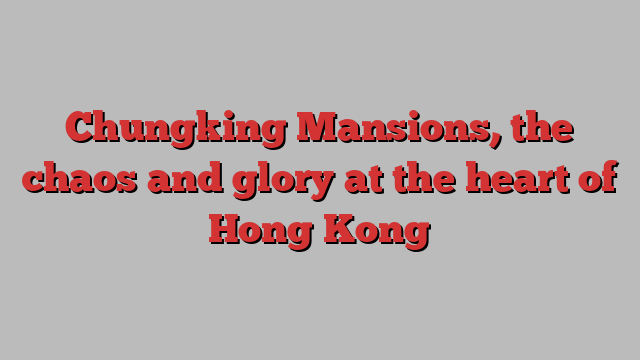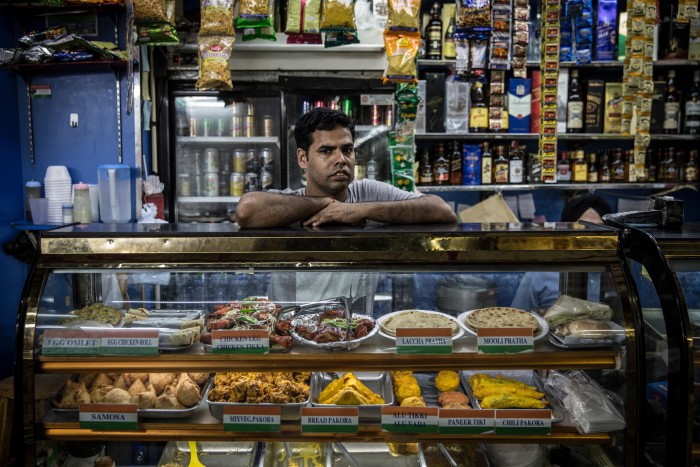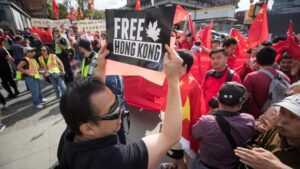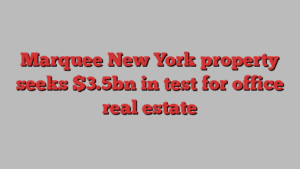
In 2010, Mukthar walked through the doors of Chungking Mansions hoping to turn his life around. He had just arrived in Hong Kong from Somalia, a refugee and entrepreneur, with $6,000 in his pocket and most of his life ahead of him. Few places would give a visa to a Somali, but Hong Kong was more open to African and Asian immigrants. And for those like Mukthar, who made it this far and whose cash would not last long, there was only one place to go, the complex of weathered high-rise buildings, located in the heart of one of the most glamorous areas of the city.
Chungking Mansions, a dense and decrepit warren of flophouses and eateries, has the air of a busy bus station. On the street outside, restaurant touts jostle for attention. Through the entrance, beneath the name printed in dull gold English and Chinese script, the ground floor resembles a bazaar. The aisles are narrow, the ceilings low, the cables and pipes visible. Where it isn’t dark, the light is too bright, and fans the size of giant satellite dishes blow a gale in corners where young men listlessly gather. Trays of samosas languish under spotlights; tins of evaporated milk teeter; pots of curry and stew bubble. There are cardboard boxes in various states of being unwrapped.
In the midst of it all are dozens of people with suitcases and backpacks. Each 17-storey block is serviced by a pair of lifts, whizzing visitors up to apartments, restaurants and guesthouses. Signposts add to the confusion. Anybody looking up is likely to see surveillance cameras winking back.
All of this is made more incongruous by the environs. Nathan Road, on which it sits, was once known as the Golden Mile and, today, is abuzz with shoppers sashaying past with Gucci-emblazoned bags. The glamorous Peninsula Hotel, which appears in the James Bond movie The Man with the Golden Gun, is not far away. Across the harbour, silver skyscrapers are resplendent against the verdant green of Victoria Peak.
For Mukthar, such glamour would have to wait. Over the next four months, he made Chungking his home, sipping Turkish coffee for five or six hours each day as he watched the comings and goings. In the early mornings, the corridors teemed with fresh arrivals in search of breakfast or a friendly face, eager to hear someone else speaking Arabic, English or Swahili. He took business cards where he could, always looking for the connection that would get him started. Mostly, he wanted to learn how deals were done in Hong Kong. Soon, “I understood the entire circle,” he told me, over wavering WiFi from Somalia. “I had to figure out how to get into the circle.”
Mukthar arrived at a moment of flux in Hong Kong. China had taken back control of the territory from Britain in 1997, just as it was becoming the world’s factory floor. If Hong Kong, home to many of the world’s biggest banks, represented high-end globalisation, then Chungking represented the low-end, the kind of trade done in cash, with limited paperwork, and for goods transported in suitcases. At one stage, estimated Professor Gordon Mathews in Ghetto at the Center of the World: Chungking Mansions, the book that first detailed this trade, 20 per cent of all mobile phones sold into sub-Saharan Africa passed through Chungking Mansions.
The Mansions represented another aspect of Hong Kong’s identity — its role as a global gateway to China. Hongkongers have long been wary of the refugees, traders and economic migrants traipsing through its corridors. For many, the Mansions signify disorder and criminality.
In recent years, as Hong Kong has become more closely aligned with mainland China, Beijing has imposed a tough new national security law, and there has been a brutal crackdown on protest. The turmoil on the streets has shifted perceptions of the chaotic Mansions and its inhabitants.
The story of Chungking Mansions begins with a Chinese-Filipino businessman, Jaime Tiampo, who came to Hong Kong in the 1930s as life got tougher for people of Chinese descent in Manila. He and his wife bought the site in Tsim Sha Tsui and developed it into a shopping centre called Chungking Arcade. Within Tiampo’s family, there are two different versions of what happened next, according to his granddaughter Ming, an art historian in Canada.
One story goes that after the second world war, her uncle and grandfather sought funds from a British bank manager for an ambitious plan to create a multi-tower development on the site. “The bank manager took [her grandfather’s] business card, ripped it up and told him, ‘No, that’s not happening.’ For me, growing up, it was always a story about the difficulty of negotiating a subject position within a colonised Hong Kong. My father understood what the racial dynamics were in the place where he lived . . . He told this story as the beginning of a story of resistance,” she said during a talk in Hong Kong.
The other version of the tale is less charged with racial subtext. In that telling, the bank manager said he would agree to a loan only if the bank took ownership of one of the five blocks, an offer that was unacceptable to Ming’s grandfather. She is unsure which story is reliable. Perhaps the truth lies somewhere in the middle. At any rate, with no financing on the table, the Tiampos decided to create one of the first “strata” buildings in Hong Kong, selling hundreds of apartments to individual buyers. Ming’s father and grandmother “took the blueprints to Manila, sold them piece by piece to friends of friends and business associates”, she told me. They sold to anybody and everybody, Brits, Indians, people already in Hong Kong and, often, businesspeople. Within three months, Chungking was fully financed and, by 1961, the Mansions had been built.
Right from the start, Chungking was much more international than anything else in the city, Ming said. With multiple owners from many different places, it was a multiracial environment and one with, people have told her, a lot of warmth. That said, “If there is a lack of centralised control, that does leave open the possibility of a certain kind of chaos.” Indeed, Chungking appears to have been synonymous with chaos from the start, its name a byword for transience, petty crime and low-end trade. There were fires and fights inside its walls, even as people talked about it as a refuge from the racism on the streets.

In the early 1970s, the Tiampos ceded responsibility for the Mansions to the other owners, eventually moving to Canada and selling the apartments they owned. In the years that followed, people from all walks of life piled into Chungking, American soldiers seeking a break from Vietnam, south Asian businessmen in search of cheap lodgings, hippies and backpackers. The apartments became businesses, restaurants and guesthouses. In his book South East Asia on a Shoestring, a bible for a generation of backpackers in the 1970s and 1980s, Tony Wheeler wrote there was only one place for budget travellers to stay in Hong Kong: Chungking Mansions.
In the 1990s, the Hongkonger filmmaker Wong Kar-wai made the critically acclaimed Chungking Express, a tale of lovelorn cops, featuring drug dealers in Chungking Mansions. He called it a “mass-populated and hyperactive place” which worked as a metaphor for the city as a whole. Many Chungking residents disliked the movie for cementing the Mansions’ reputation as dangerous and unwelcoming. Yes, there was violence, but that was also true of other places in Hong Kong. The management was cleaning up Chungking, defenders maintained, installing CCTV to cut down on crime.
But the idea of Chungking as a metaphor for Hong Kong had some resonance. Hong Kong had long been an entrepôt, after all. It offered a portal to China which, after its entry to the World Trade Organization in 2001, had come to dominate global manufacturing. People in the global south wanted a part of that too, and the shabby complex on Nathan Road was one way to get it.
Mukthar spent four years in Chungking, determined to make the most of it. Many people in Chungking are looking for a deal. Some pan out, but most don’t. Many in Chungking subsist on little. But Mukthar got lucky quickly.
His first trade was with a gentleman, he thinks from Kenya, who had arrived with fistfuls of emeralds. Mukthar knew little about emeralds, but his work building contacts around Chungking was starting to pay off. He knew someone who might be interested. There was some back and forth, some negotiation and a deal was struck. “That got me started with a very small amount of commission. It paved the way, you began to build trust,” he told me.
He got more customers, sometimes three or four in a day, moving between Chinese clients and their African counterparts. Some clients he took to the Sheraton Hotel, which was cheap if you just had coffee in the lobby and blessedly quiet, at least compared with Chungking.
If a trader arrived with gold, Mukthar would advise him that no one was interested. The trader might balk at that assessment but, after a couple of weeks in the heat of Chungking, the fans whirring, the corridors crowded, their hotel bills mounting, they would become more receptive to whatever price was on offer. Conversations might take place over chai — chai tea was in great demand in Chungking, Mukthar once managed to sell a container of Saudi evaporated milk to vendors in the Mansions — and the deal would be done.
By then, he had overstayed his visa and applied for asylum, betting the authorities would turn a blind eye to his dealmaking as long as he stayed below the radar. Over time, he became an agent for a Chinese machinery company for more than a dozen African countries. Other trades came his way: 4,000 kilogrammes of pink Somali abalone, which stank out a warehouse but netted him a hefty sum; a Zanzibar seaweed venture, as slippery as the product itself.
Everything was possible in Chungking. He could buy a truck, arrange its shipment to Africa and remit the money, all while enjoying a kebab for lunch. “There are buyers who will not come to New York because of the visa. But Hong Kong, because it is open, everyone will come who has 20,000, 200,000, $2mn.” The presence of so many money changers meant that “if at 9pm [in Chungking] you want to get $1mn in business, you can get it,” he said. “I have been everywhere on this planet, US, Canada, Australia . . . I know very well that there is no place on this planet like Hong Kong or Chungking Mansions.”
The end, when it came, was swift. By 2014, Mukthar’s business relationships were breaking down. He was shocked to discover one colleague had had an affair with another’s wife. A strict Muslim, Mukthar thought “This was very disgusting.” More pressingly, he saw the potential repercussions. The wronged husband “will be very angry, he will report us to immigration, that is why I decided to leave”. Mukthar had an order in his hand that could have been extremely lucrative, but he walked away from the deal, Chungking and Hong Kong.
He might have got out at the right time. In the following years, business slowed down. The wholesale market in which Mukthar had thrived was becoming more fragile. An African logistics company that used to ship 20 containers a month was, by 2017, shipping just four or five. Their competitors were shutting down. There just wasn’t enough business to go around. People moved to Guangzhou in southern China, for example, as it became easier to get visas to the mainland, closer to Chinese clients.
At the same time, with the rise of ecommerce, many Chinese businesses were selling directly into Africa, leaving less of a role for Chungking’s middlemen. Outside Chungking’s doors, Hong Kong was in turmoil. In 2019, pro-democracy protesters, outraged by the planned introduction of a law that could see people sent to Beijing for trial, clashed on the streets with police. In October that year, Jimmy Sham, a protest organiser, was beaten up by men identified as being of south Asian origin. There were calls on social media to attack the mosque, Chungking and south Asians in the city. The mood in the Mansions was tense.
“A lot of people were panicking because we saw things were escalating,” said Jeffrey Andrews, a Hongkonger of Indian descent who works for the Christian Action Centre for Refugees in Chungking Mansions. The grandson of an Indian chef who had built his life in the territory, he had grown up wary of Chungking, ducking in and out of the alleys to get curry, but always associating it with trouble. He knew how cautious most Hongkongers were, how sceptical of all minorities they could be. It was, he said, “a very scary moment”.
In an effort to defuse the situation, he and his friends stood outside Chungking on October 20 handing out water bottles to protesters. That day was a “watershed”, he said. “It was not a political move, it was just to say we minorities are part of Hong Kong.” Hongkongers flooded into Chungking, many for the first time. Ironically, that period of protests was, Andrews joked, one of the first times in Chungking’s history that people felt safer inside than out.
Five years on, the national security law has been enforced. So has another, “Article 23”, which imposes life imprisonment for acts of treason and increases sentences for crimes such as sedition. The protests have had one unexpected long-term impact. They have contributed to the changing perception of Chungking. More Hongkongers visit the Mansions, often on tours run by Andrews and the refugee centre or through the Africa Center, a hub to promote African-Asian relations run by Innocent Mutanga. Mutanga said that the more authorities angered Hongkongers, the more people visited Chungking. They saw something there that represented what they had been fighting for.
On one of his “Five Senses” tours, organised for the staff of a nearby hotel, Andrews introduced me to the restaurateur who supplied the city’s quarantine hotels with Indian food during Covid. This helped the Mansions survive the pandemic, while strict lockdowns crippled the city economically. Many of the hardworking Asian and African families here are true Hongkongers, Andrews tells his tour guests. The older visitors often have the most surprising reactions. His friends thought they would be the most racist, he said, but they wanted to understand a building they now see as representing something unique about their city. They’re not the only ones. Asset manager BlackRock employees recently participated in a trip to the Mansions for an “immersive and cultural experience”.
Of course there is vice in Chungking Mansions — “It is not a church,” Andrews said. Yet the way in which he and others talk about the buildings, as a centre of a community, a sanctuary, lends it a faintly sacred air. Andrews showed me videos of the Muslim community breaking fast after Ramadan. One shop owner provided the carpets, another the salads on tables lined up in the halls. Next door to the refugee centre, they are planning Hong Kong’s first ethnic minority museum. On one visit, I met students from the mainland filming a documentary on Hong Kong’s identity. They have made Chungking their focus. In the wake of the tumult of recent years, said Mathews, “Anyone can be a Hongkonger it seems. The ethnic other has become mainland Chinese.”
Where once they shipped mobile phones to Africa, now Chungking’s entrepreneurs take lunch orders. Some of the restaurants have gone high end, offering suckling pig for $1,000 to a different kind of guest. The building is now more than 60 years old, several generations in the life of a Hong Kong plot. Any other place might have been sold and redeveloped. No one can give me an exact figure of the number of owners — it runs into the several hundreds — but most people say it’s unlikely they would all agree to a sale. Still, it is a prime location.
On a blazing hot day, Andrews and I climbed up on to the roof of one of the blocks, clambering up a spiral staircase. He gestured at the world-class museums, five-star hotels and gleaming new high rises all around. He has been coming up to this roof for more than a decade, he said. Each time, he is overwhelmed by the changes around him. “I do worry for this place,” he said.
In Somalia, Mukthar is less pessimistic. Even today, he relies on the contacts he made in Chungking to do business. “It was a different planet,” he said. Even if it is knocked down, something of its spirit will survive.
Orla Ryan is the FT’s deputy Asia news editor
Follow @FTMag to find out about our latest stories first and subscribe to our podcast Life and Art wherever you listen

